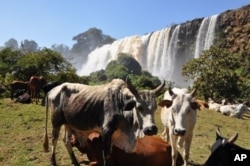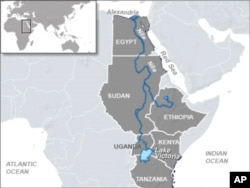This is Part 1 of a 5-part series: Sharing the Nile's Waters
Parts 1 / 2 / 3 / 4 / 5
The Nile is the world’s longest river, spanning a distance of almost 6,600 kilometers. It is formed from the White Nile, which originates in the Great Lakes region of central Africa, and the Blue Nile, which begins at Lake Tana in Ethiopia. The two rivers meet in Sudan and travel northwards, flowing through Egypt until finally emptying into the Mediterranean Sea.
Water use issues have long been a source of contention among the Nile Basin countries, who disagree on what constitutes an equitable distribution of the river's waters. For decades, the answer to that question has been determined by colonial-era agreements that heavily favored Egypt. A recently negotiated agreement by upstream countries could alter the historic water-sharing arrangements.
Entitled the Cooperative Framework Agreement, it was recently signed by Burundi, which joins other countries -- Kenya, Uganda, Ethiopia, Tanzania and Rwanda – that are seeking what they consider a more equitable share of the river’s waters. Egypt, Sudan and the Democratic Republic of Congo are still mulling over the framework’s provisions.
Framework
The agreement marks the culmination of years of negotiations among the Nile Basin countries. The process was launched by the seven upstream countries, which see old treaties favoring Egypt and Sudan as an unfair vestige of colonialism.
Egypt has long refused to re-negotiate the colonial-era treaties if it means cutting its share of water. But the former minister of water resources and irrigation, Mahmoud Abu-Zeid, sees the framework agreement as a positive beginning.
“During the last ten years, we have been working on a framework and everybody agreed to more than 95 percent of the articles,” he says. “We believe having six countries sign the framework opens the door for working on cooperative programs and projects along the Nile.”
Egypt’s stance
Burundi’s signing came amidst a major political transition in Egypt following the departure of long-time president Hosni Mubarak. Abu Zeid says just like previous governments, Egypt’s interim military rulers take the issue of the Nile waters very seriously.
“When the government met for the first time, he says, “They put on their agenda as the first item the Nile water. They have indicated the Nile water issue is a priority issue, a national security issue.”
The former Egyptian minister says what worries his country most are efforts by some to scrap the “No Harm” provision of the old treaties – a provision requiring that upstream uses of the Nile waters not interfere with the current uses and rights of the downstream countries, Egypt and Sudan. He says if these principles are honored, the framework under consideration will be acceptable to all the Nile Basin countries.
So does the framework agreement address the concerns of all the Nile Basin countries? “To a large extent,” says Henriette Ndombe, former executive director of the Entebbe-based Nile Basin Initiative.
“Without Nile, Egypt is a desert. Other countries also need water. All the countries need water. This all has been taken into account in this cooperative framework agreement – except Article 14b,” she explains.
Article 14b
The contentious Article 14b of the framework agreement refers to water sharing, and Egypt and Sudan have rejected all efforts to drop it in the new agreement. Egypt says even with the favorable provisions in existing agreements, the Nile alone will not be able to meet the country’s water needs after 2017. The government has previously threatened military action against upstream nations if they construct projects that slow the flow of water to Egypt.
Ndombe says war is not the answer for resolving the outstanding issues.
“The seven countries don’t want to fight Egypt because of water. And there is no need for Egypt to fight other countries because of water. They cannot fight against seven countries. Better for them is cooperation. That is, join the six countries which have signed the cooperative framework agreement,” she says.
Old Treaties
A 1959 treaty between Egypt and Sudan apportioned nearly 90 percent of this resource to the two downstream countries -- 55.5 billion cubic meters to Egypt, and 18.5 billion cubic meters to Sudan. The treaty did not include the upstream countries, including Ethiopia, which contributes 85 percent of the river’s water. Egypt has veto power based on a provision carried over from an agreement it signed with Britain in 1929.
Agreement
The framework agreement includes the creation of a permanent commission that will manage the Nile waters and guarantee an equitable allocation of its resources. The deadline for signing the agreement is May of this year. Once the signing process is completed, the accord goes before the legislatures of the countries for ratification.
Former Egyptian water resources minister Mahmoud Abu-Zeid says a practical approach to addressing the concerns of upstream countries will be to develop under-utilized parts of the Nile Basin to help generate additional sources of water. Analysts warn if the controversy over use of the river is not handled carefully, it could generate conflict in the not-too-distant future.





